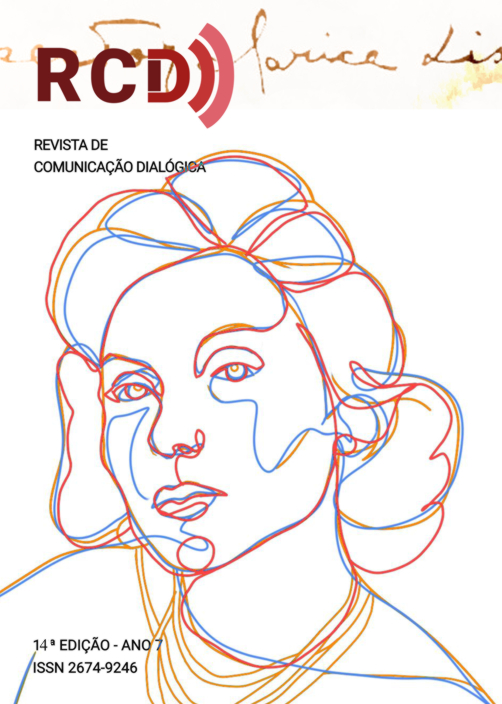O BRASIL DOS ANOS 70 E A TELENOVELA "DANCIN' DAYS"
Considerações sobre uma cultura consumista brasileira a partir da personagem Júlia Matos
DOI:
https://doi.org/10.12957/rcd.2025.91534Palavras-chave:
Telenovela, Dancin' Days, Consumismo, Cultura, BrasilResumo
Este artigo busca entender a forma com que a novela "Dancin’ Days" (1978-1979) assimilou em sua linguagem teledramatúrgica aspectos de uma cultura consumista do Brasil nos anos 70. Para alcançar isto, a análise irá primeiramente esclarecer a posição dessa telenovela em uma linha de montagem novelesca que estava sendo estabelecida pela TV Globo nessa década, marcada por um ideal realístico que passa a caracterizar a construção dos enredos. Faremos assim considerando também os traços dessa indústria cultural que estabeleciam limites e interações entre o real referenciado na época e a mensagem própria das telenovelas criadas. Tendo explicado isso, iremos nos deter em seguida na relação do Brasil com uma cultura consumista, buscando elucidar o que se entende como tal, para enfim abrir uma discussão que irá se restringir ao percurso da personagem Julia Matos (Sonia Braga) na narrativa novelística. O resultado alcançado com esse empreendimento é compreender mais de uma cultura brasileira significada por valores de consumo, como igualmente a presença das telenovelas nesses jogos de um mercado cultural.
Referências
CARDOSO DE MELLO, João Manuel; NOVAIS, Fernando A. Capitalismo tardio e sociabilidade moderna. In: SCHWARCZ, Lilia (org.). História da vida privada no Brasil: Contrastes da intimidade contemporânea. 1ª edição. São Paulo: Companhia de Bolso, 2023.
DANCIN’ DAYS. Direção: Daniel Filho. Produção: TV Globo. Interpretes: Sonia Braga, Antônio Fagundes, Glória Pires, Joana Fomm e outros. Roteiro: Gilberto Braga. Rio de Janeiro: TV Globo, 1978-1979. (174 capítulos), son., color. Disponível em: <https://globoplay.globo.com/dancin-days/t/LsB2MtH9Yg/>
HAMBURGER, Esther. Diluindo fronteiras: a televisão e as novelas no cotidiano. In: SCHWARCZ, Lilia (org.) História da vida privada no Brasil: contrastes da intimidade contemporânea. 1ª edição. São Paulo: Companhia de Bolso, 2023.
_________. O Brasil antenado: a sociedade da novela. Rio de Janeiro: Jorge Zahar Ed., 2005.
LIPOVETSKY. A estetização do mundo: viver na era do capitalismo artista. Tradução de Eduardo Brandão. 1ª edição. São Paulo: Companhia das Letras, 2015.
_________. A felicidade paradoxal: ensaio sobre a sociedade do hiperconsumo. Tradução Patrícia Xavier. Lisboa: Edições 70, 2017.
MARINS, Paulo César Garcez. Habitações e vizinhanças: limites da privacidade no surgimento das metrópoles brasileiras. In: SEVCENKO, Nicolau. História da vida privada no Brasil: República: da Belle Époque à era do rádio. 1ª edição. São Paulo: Companhia de Bolso, 2021.
NAPOLITANO, Marcos. Cultura brasileira: utopia e massificação. 4ª edição. São Paulo: Contexto, 2020.
O’DONNELL, Julia. A invenção de Copacabana: culturas urbanas e estilos de vida no Rio de Janeiro (1890-1940). Rio de Janeiro: Zahar, 2013.
PRADO, Luiz Carlos Delorme; EARP, Fábio Sá. O “milagre” brasileiro: crescimento acelerado, integração internacional e concentração de renda (1967-1973). In: FERREIRA, Jorge; DELGADO, Lucília de Almeida Neves (orgs.). O Brasil Republicano 4: O tempo do regime autoritário: ditadura militar e redemocratização: Quarta República (1964-1985). 10ª edição. Rio de Janeiro: Civilização Brasileira, 2020.
RIBEIRO, Ana Paula Goulart; SACRAMENTO, Igor. A renovação estética da TV. In: RIBEIRO, Ana Paula Goulart; SACRAMENTO, Igor; ROXO, Marco (orgs.). História da televisão brasileira: do início aos dias de hoje. São Paulo: Contexto, 2018.
SEVCENKO, Nicolau. A corrida para o século XXI: no loop da montanha-russa. São Paulo: Companhia das Letras, 2001.
SCHWARCZ, Lili Morit; SOUZA, Laura de Mello e; NOVAIS, Fernando A. Brasil: o tempo e o modo. In: SCHWARCZ, Lilia(org.). História da vida privada no Brasil: Contrastes da intimidade contemporânea. 1ª edição. São Paulo: Companhia de Bolso, 2023.
XEXÉO, Artur; STYCER, Mauricio. Gilberto Braga: o Balzac da Globo: a vida e obra do autor que revolucionou as novelas brasileiras. 1ª edição. Rio de Janeiro: Intrínseca, 2024.
Downloads
Publicado
Como Citar
Edição
Seção
Licença
Copyright (c) 2025 Pedro Alexandre de Albuquerque

Este trabalho está licenciado sob uma licença Creative Commons Attribution 4.0 International License.
Os Direitos Autorais dos artigos publicados na Revista de Comunicação Dialógica pertencem ao(s) seu(s) respectivo(s) autor(es), com os direitos de primeira publicação cedidos à Revista. Toda vez que um artigo for citado, replicado em repositórios institucionais e/ou páginas pessoais ou profissionais, deve-se apresentar um link para o artigo disponível no site da RCD. A Revista de Comunicação Dialógica está licenciada com uma Licença Creative Commons (by-nc-nd).


